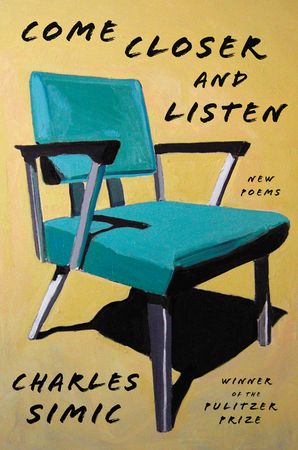Poetry Review: “Come Closer and Listen” — Is Brusque and Amusing Enough?
By Ed Meek
In his new book, poet Charles Simic employs his customary strategies, but he seldom achieves the intensity he once did.
Come Closer and Listen by Charles Simic. HarperCollins, 75 pages, $24.99.
 Charles Simic is now 81 years old. He’s been a force in the world of poetry for many years. He has published forty volumes of verse. He writes articles about poetry for The New York Review of Books. He was a Poetry Editor for The Paris Review, won the Pulitzer Prize in 1990, and was the recipient of a MacArthur Grant. His poems are generally short and combine colloquial language, observed details, and surrealism. Here’s an early poem that has stuck with me. It’s called “Fear”:
Charles Simic is now 81 years old. He’s been a force in the world of poetry for many years. He has published forty volumes of verse. He writes articles about poetry for The New York Review of Books. He was a Poetry Editor for The Paris Review, won the Pulitzer Prize in 1990, and was the recipient of a MacArthur Grant. His poems are generally short and combine colloquial language, observed details, and surrealism. Here’s an early poem that has stuck with me. It’s called “Fear”:
Fear passes from man to man
Unknowing,
As one leaf passes its shudder
To another.
All at once the whole tree is trembling,
And there is no sign of the wind.
Despite so brief, it’s a poem that resonates. The imagery perfectly crystallizes the emotional and intellectual elements in its central dramatic idea: a parable about the way that fear affects people — even after its origin has been forgotten. Its relevance is obvious: these days it feels at times like we’re living in The Republic of Fear.
In his new book, Simic employs the same strategies, though he seldom achieves the intensity he once did. “The Hand that Rocks the Cradle” is a two-line poem: “Time—that murderer/ No one has caught yet.” That’s a gripping opening, but the metaphor calls for far more development.
In any case, Simic is a member of a group of contemporary poets who are accessible. He uses simple language and a casual off-hand tone. For example, in “Some Birds Chirp”:
Others have nothing to say.
You see them pace back and forth,
Nodding their heads as they do.
It must be something huge
That’s driving them nuts—
Life in general, being a bird.
Too much for one little brain
To figure out on its own.
Still, no harm in trying, I guess.
Even with all the racket
Made by its neighbors,
Darting and bickering nonstop.
The question is: Is it enough for Simic to be a brusque, amusing observer?
Many of the poems in this collection are about death — not surprising, given the writer’s age. This one is called “The Last Lesson”:
It will be about nothing.
Not about love or God,
But about nothing.
You’ll be like the new kid in school
Afraid to look at the teacher
While struggling to understand
What they are saying
About this here nothing.
There’s a heated argument going on among the writers these days about the use of pronouns. When Simic writes “What they are saying” — is the pronoun singular? Does it refer to the teacher? In addition, Simic doesn’t have much to offer here — beyond the ambiguity of the word nothing.
The most powerful poem in Come Close and Listen is “Ghost Ship.”
Those blessed moments
That pretend
They’ll stay with us forever—
Soon gone,
Without a fare-the-well.
What’s the rush?
I heard myself say.
You have the right
To remain silent,
The night told me
As I sat in bed
Hatching plans
On how to hold the next
Captive in my head.
I recall a window thrown open
One summer day
On a grand view of the bay
And a cloud in all that blue
As pale as the horse
Death likes to ride
Always happy to shoot the breeze,
That lone cloud
Was telling me
As it drifted out to sea,
Toward some
Ship on the horizon,
That had already
Set sail
And was about to vanish
Out of sight,
On the way to some port
And country
Without name.
A ghost ship,
Most surely,
But mine all the same.
In this poem, we have the customary paring of plain language and direct imagery. But each line takes the poem’s journey a little further, and each step forward is surprising. There is some subtle rhyming along with the usual economy. At first, the subject seems to be memory — but soon it becomes clear Simic is talking about death. Here he looks at nothingness, but inspires by giving us more than just ambiguity to meditate on.
Ed Meek is the author of Spy Pond and What We Love. A collection of his short stories, Luck, came out in 2017. WBUR’s Cognoscenti featured his poems during poetry month last year.
